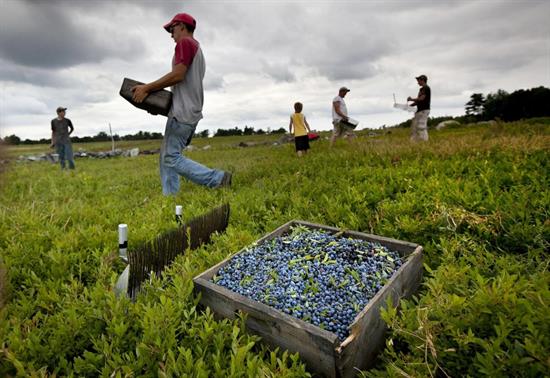Press Releases
Pingree Announces $40.5 Million to Boost Conservation, Climate Resilience Efforts in MaineMade possible by the Inflation Reduction Act, the USDA announced a historic $1.5 billion for conservation partnerships across the U.S., including more than $40.5 million for a pair of initiatives right here in Maine.
Washington,
October 23, 2024
Today, Maine First District Congresswoman Chellie Pingree announced more than $40.5 million for conservation projects in Maine. Nearly $25 Million will support a project, spearheaded by the Nature Conservancy, to provide much-needed upgrades to road-stream crossings, allowing native wildlife—including Atlantic salmon, brook trout, mussels, and turtles— to migrate more easily, helping promote healthy habitats throughout the state. In addition, the Wild Blueberry Commission of Maine will receive $15.5 million to help bolster the resilience of Maine’s wild-blueberry industry against threats related to climate change. The funding, made possible through the Farm Bill and the Inflation Reduction Act, was part of a historic $1.5 billion investment for 92 partner-driven conservation projects through the Regional Conservation Partnership Program (RCPP) a partner-driven approach to conservation that funds solutions to natural resource challenges on agricultural land. “These vital conservation projects will have a lasting impact on Maine’s natural ecosystems and agricultural industries. By investing nearly $25 million to restore road-stream crossings, we are not only protecting endangered species like Atlantic salmon and brook trout, but also safeguarding our environment for future generations. Additionally, the $15.5 million in funding for the Wild Blueberry Commission will help our farmers adapt to the realities of climate change, ensuring that one of Maine’s most iconic crops can thrive despite unpredictable weather patterns,” said Pingree. “Thanks to the Inflation Reduction Act, we’re building a more resilient future for Mainers by strengthening both our environment and our economy. These are significant investments—in our resources, our infrastructure, and our communities—that will help protect our future.” The funded initiatives in Maine are: $24,999,983 for the Resilient Infrastructure & Free Flowing Streams (RIFFLS) project (The Nature Conservancy of Maine) The Nature Conservancy’s Resilient Infrastructure & Free Flowing Streams RCPP will improve aquatic organism passage (AOP) for native fish and wildlife species throughout Maine by upgrading road-stream crossings and other means of improved fish passage. Habitat fragmentation caused by AOP barriers is the most critical direct threat to Endangered Atlantic salmon, Eastern brook trout, other diadromous and native fish, and protected wildlife species including mussels and turtles. $15,586,000 for the Maine Wild Blueberry Climate Adaptation Project(Wild Blueberry Commission of Maine) The Maine Wild Blueberry Climate Adaptation Project aims to enhance the resilience of Maine's wild blueberry industry against climate-induced challenges, particularly rainfall volatility, but also the increased risk of late-frost events. This project will implement innovative irrigation, mulching, and water management practices working with an estimated 25-45 producers, improving farm sustainability and economic stability. “The Regional Conservation Partnership Program is an example of public-private partnership at its best,” said Agriculture Secretary Tom Vilsack. “Thanks to the boost in funding from the Biden-Harris Administration’s Inflation Reduction Act we’re able to invest even more in this popular and important program and increase our conservation impact across the country, supporting our nation’s farmers, ranchers and forest landowners while at the same time protecting our natural resources for the future.” The IRA, championed by House Democrats and signed into law by President Biden in August 2022, represents the single largest investment in climate and clean energy solutions in American history. The IRA provides an additional $19.5 billion over five years to support USDA’s conservation programs that yield climate change mitigation benefits. Pingree has been an organic farmer since the 1970s and is a recognized national policy leader on sustainable food and farming. As a member of both the House Agriculture Committee and House Appropriations Agriculture Subcommittee, Pingree continues to be a vocal advocate for agriculture and food policy reform. Because of her leadership, the 2018 Farm Bill more than doubled funding for organic research, created the first federal produce prescription program, and created the local agriculture market program with permanent federal funding. Pingree is the author of the Agriculture Resilience Act, comprehensive legislation that sets a bold vision of reaching net-zero greenhouse gas emissions in U.S. agriculture by the year 2040. In addition to the Agriculture Committee, Pingree is the Ranking Member of the Appropriations Interior, Environment, and Related Agencies Subcommittee, which she chaired in the 117th Congress.
### |

